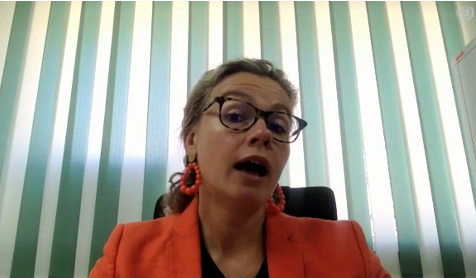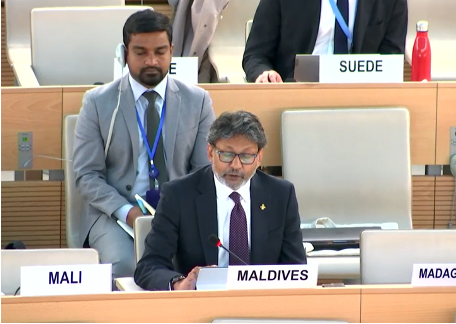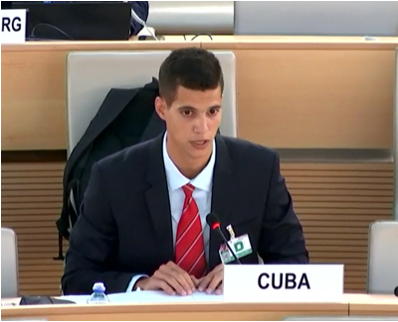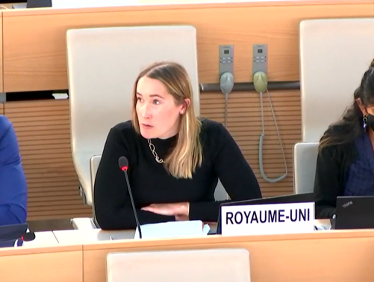The 51st Session of the Human Rights Council
12 September 2022 – 7 October 2022
Item 3: Interactive Dialogue on the Report of the Working Group on Arbitrary Detention
19th September 2022
By Martin Browne / GICJ
Executive Summary
Arbitrary Detention is widespread, touching almost every country. The Working Group on Arbitrary Detention conducts reviews, deals with urgent requests and facilitates dialogue with state authorities to obtain information and the release of detainees.
In 2021-2022 the group restarted its country visits, promoted thematic reports on the use of detention in drug enforcement, and encouraged the adoption of principles on effective interviewing of detainees without resort to torture. The group adopted a total of 85 opinions concerning 175 persons in 42 countries, further 53 urgent appeals and 206 allegation letters were sent and the group noted the release of 15 people following its intervention. Despite these efforts there was a notable increase in reports of secret detentions, torture in detention areas and use of arbitrary arrests to crackdown on protestors.
The Vice-Chair, while highlighting examples of exemplary practice, noted that many states provide timely responses to the requests of the Working Group on Arbitrary Detention but not always a substantive response with sufficient information for detailed analysis to be carried out about the legitimacy of a detention. A number of states and NGOs deplored the relatively low rate of substantive engagement with the Group’s requests for information and relief. A number of other countries criticised the group for not engaging in a more thorough filtering of communications being sent by political actors within their countries. The Vice-Chair strongly rebutted these arguments by highlighting the mechanism has no mandate to filter complaints based on the substance of the requests and that all reports of arbitrary detention are taken seriously, with states encouraged to provide more information to the group to help clarify the alleged situation.
Geneva International Centre for Justice deplores the use of arbitrary detention, which is a tool used by weak regimes with no respect for the rule of law. This abuse of multiple rights is exacerbated when detention is used to extract confessions using methods of torture. GICJ calls on all states to refrain from secret detentions that circumvent due process and disregards safeguards against arbitrary detention, against which there is an absolute prohibition. Access to effective remedy and reparation is vital for those detained unlawfully and states must carry out an ongoing review of the necessity of detention.
Background
The Working Group on Arbitrary Detention was established by the Commission on Human Rights in its resolution 1991/42. It is entrusted with the investigation of cases of alleged arbitrary deprivation of liberty according to international human rights standards. The mandate of the Working Group was extended over subsequent periods, most recently in 2019, and has expanded to also cover the issue of administrative custody of asylum seekers and immigrants.
The Working Group investigates alleged cases of arbitrary detention by sending urgent appeals and communications to concerned Governments to clarify and/or bring their attention to these cases. The Working Group also considers individual complaints under its regular communications procedure, leading to the adoption of opinions as to the arbitrariness of the detention. In addition, the Working Group conducts country visits to assess the situation of deprivation of liberty in the country
Arbitrary is defined as when:
- No legal basis is invoked to justify the deprivation of liberty
- Deprivation of liberty results during a person’s exercise of rights or freedoms guaranteed by the Universal Declaration of Human Rights and the ICCPR.
- International standards of fair trial rights have not been observed
GICJ has repeatedly presented statements, information and cases to the Human Rights Council and the Working Group on the situation of arbitrary detention in Iraq, Syria, Ethiopia, and Afghanistan which has helped increase the prominence on the international agenda.
Summary of the Report of the Working Group
The Working Group has restarted country visits with a visit to Maldives in November 2021, unfortunately a number of other requests to visit States have been refused, ignored, or are yet to be confirmed by host governments.
Throughout 2021 and 2022 the Working Group has been involved in activities to promote their earlier report on the link between arbitrary detention and enforcement of drug policies, including through meetings and briefings with the African Commission on Human and Peoples’ Rights, Special Rapporteurs and other branches of the UN
At its ninetieth, ninety-first and ninety-second sessions, the Working Group adopted a total of 85 opinions concerning 175 persons in 42 countries in which those bodies requested States to take account of the Working Group’s opinions and, where necessary, to take appropriate steps to remedy the situation of persons arbitrarily detained. These states were also requested to inform the Working Group of the steps they had taken in response.
A total of 15 people have been released over the last 12 months following the intervention of the Working Group, although the report notes not every instance can be directly attributed to that intervention. The Working Group notes grave concern that it continues to receive information about reprisals suffered by individuals interacting with the Group’s procedures, or who have been the subject of an urgent appeal or opinion.
During 2021, the Working Group sent 53 urgent appeals to 31 Governments and, in one case, to other actors, 206 allegation letters and other letters to 101 Governments and, in three cases, to other actors, concerning at least 682 identified individuals.
On the thematic issue of Secret Detentions, the report reiterates that the prohibition on the practice of placing individuals in incommunicado detention for the purposes of investigation, or any other reason, for prolonged periods without disclosing their whereabouts amounts to secret detention and is in fact a form of enforced disappearance. Such measures are usually devoid of judicial oversight and formal charges, which amounts to arbitrary.
Detained persons must be able to challenge the lawfulness of detention before a court without delay, and defend themselves through legal counsel of their choosing. Consequently, every instance of secret detention is de facto arbitrary detention, as there can be no reasons that would justify the placement of any person outside the protection of the law.
On the thematic issue of Effective Interviewing, the Working Group endorsed the Mendez Principles with the aim of ensuring reliable information is obtained through investigative techniques and the extraction of confessions does not occur through ill-treatment and torture. The report emphasises the safeguards which States are required to put in place to prevent occurrences of torture and ill-treatment also have a crucial role to play in minimizing and even preventing instances of arbitrary detention. To this end, the Working Group invites all States to give these due consideration in order to enhance their effective implementation in practice by law enforcement authorities.
This final thematic issue covered concerns the deprivation of liberty of older persons in criminal justice contexts as well as other settings such as health-care or social care.States should not apply too narrow a definition of “deprivation of liberty” as each instance of alleged deprivation of liberty must be examined in the light of the individual circumstances of that case. If an individual is not at liberty to leave a place or facility, then all the appropriate safeguards that are in place to guard against arbitrary detention must be respected. Noting the above, it is of paramount importance that an individualised assessment of each context that gives rise to the question of whether the situation amounts to deprivation of liberty be carried out independently. The Working Group acknowledges the vulnerable situation of older persons, which may be exacerbated by the conditions of detention, especially as regards appropriate and essential health care, which most detention facilities struggle to provide.
Interactive Dialogue with the Working Group
 On 19th September 2022, during the 51st session of the Human Rights Council, the Vice Chair of the Working Group, Elina Steinerte introduced the report as outlined above. She added, in addition to the outline of the report, further comments and noted that states mainly provide timely responses to the Working Group’s requests, but a good response rate does not necessarily reflect the implementation of the recommendations in practice, both of which need improvement to fulfil states’ international obligations. Finally she called on states to whom requests for country visits have been made to respond positively to arrange visits in the coming months including El Salvador, Comoros Islands, Canada, Cuba, India, and Saudi Arabia.
On 19th September 2022, during the 51st session of the Human Rights Council, the Vice Chair of the Working Group, Elina Steinerte introduced the report as outlined above. She added, in addition to the outline of the report, further comments and noted that states mainly provide timely responses to the Working Group’s requests, but a good response rate does not necessarily reflect the implementation of the recommendations in practice, both of which need improvement to fulfil states’ international obligations. Finally she called on states to whom requests for country visits have been made to respond positively to arrange visits in the coming months including El Salvador, Comoros Islands, Canada, Cuba, India, and Saudi Arabia.
 The Ambassador of The Maldives spoke first as a country mentioned in the report. He noted the positive outcomes of the country visit by the Working Group and surveyed his country’s progress over the last four years including actions to audit the prison system, close down problematic locations and implement good practices as guided by the Working Group.
The Ambassador of The Maldives spoke first as a country mentioned in the report. He noted the positive outcomes of the country visit by the Working Group and surveyed his country’s progress over the last four years including actions to audit the prison system, close down problematic locations and implement good practices as guided by the Working Group.
The European Union delegate welcomed the release of detainees mentioned in the report and criticised the ongoing practice of secret detentions being used as a tool to exert political pressure.
Speaking on behalf of the Nordic Baltic countries, the representative of Latvia welcomed the resumption of country visits, but expressed concerns over the low response rate and a decrease in engagement with the follow-up procedures. Further concerns were raised about examples of confessions via torture being used contrary to admissibility rules. She welcomed the Working Group’s adoption of the Mendez Principles before enquiring about more detailed information on how precisely the Principles can be used to help states meet their obligations.
The representative of France regretted the difficulties faced by the Working Group and urged states to support the Draft Resolution to renew the mandate, calling on member states to step up cooperation efforts and to put in place systematic inventories of all detained persons.
The Egyptian representative criticised procedures of the Working Group that are used abusively, calling on the Group to verify the veracity of communications referring to Egypt to prevent unfounded allegations being put forward.
 Caution was urged by the representative of Cuba who reminded the Working Group to to not adopt preconceived notions, to act objectively, and to check the reliability of sources. They repeated previously expressed positions that Special Procedures should not be used to ends that are not related to the defence of human rights.
Caution was urged by the representative of Cuba who reminded the Working Group to to not adopt preconceived notions, to act objectively, and to check the reliability of sources. They repeated previously expressed positions that Special Procedures should not be used to ends that are not related to the defence of human rights.
The representative of the State of Palestine identified that over 4,500 Palestinians are being held by Israel, including 720 arbitrary detentions, and are subject to maltreatment in grave violation of international law and called for more action to correct long standing abuses.
The delegate from Iraq noted their appreciation for the work done by the Working Group on arbitrary detention. On specific cases raised in the Working Group report concerning Iraq, the representative denied that arbitrary detention does not apply to the named persons who were found guilty of criminal offences and the embassies of those respective nationals had been made aware.
The Russian Federation’s representative criticised the selectivity and non-objectivity of the Working Group, and drew attention to the fact the Working Group did not reflect the country concerned position in multiple cases which was a breach of the requirement to give the concerned state the opportunity to present their position.
 The representative of the United Kingdom of Great Britain and Northern Ireland thanked the Working Group for their world, deplored information received about reprisals against those raising cases and noted that arbitrary detention is a hallmark of authoritarian regimes and that safeguards against unacceptable forms of detention cannot be ignored.
The representative of the United Kingdom of Great Britain and Northern Ireland thanked the Working Group for their world, deplored information received about reprisals against those raising cases and noted that arbitrary detention is a hallmark of authoritarian regimes and that safeguards against unacceptable forms of detention cannot be ignored.
The Cambodian delegate lamented that that Working Group report did not take into account their factual or legal reports and contains incorrect information about the position in Cambodia, as access to lawyers is essential in a fair justice system they have increased access to pro bono legal aid following the Working Group’s previous recommendations.
A number of NHRIs and NGOs spoke outlining more precise measures that need to be taken to improve conditions of detention, with individual cases in Burundi, Hong Kong, Uzbekistan, Turkey, China and Cuba all raised. A common theme raised by NGOs concerned detentions following peaceful protests, where crackdown attempts by law enforcement officers often leads to arbitrary arrest followed by arbitrary detention of individuals enjoying their fundamental freedoms. The effectiveness of the Working Group was also touched upon by multiple organisations, with calls for greater support going hand in hand with calls for greater scrutiny of particular situations such as the use of very lengthy sentences for social media posts. Finally, capacity-building was noted as an important tool in training law enforcement and prison officers on basic human rights norms as well as allowing independent inspection and verification of claims of human rights compliance.
In concluding remarks, the Vice-Chair of the Working Group, Leina Steinerte rebutted a number of claims made by states in the Interactive Dialogue. In response to those states claiming that their views were ignored, she noted that the procedures of the Working Group allow a set number of days for a state’s response to be considered and it is regretful that many states chose to not engage with the clear deadlines for responses. On the claim of a politicised mechanism, she underlined the lack of reference in the mandate to allow the Working Group to engage in substantive filtering of complaints received hence all non-trivial complaints are forwarded to states for comment. Finally she recalled that the Working Group on Arbitrary Detention is the only mechanism with truly universal coverage that anyone from anywhere in the world can submit a complaint, whether or not party to a treaty.
Position of Geneva International Centre for Justice
Geneva International Centre for Justice deplores the use of arbitrary detention which remains a widespread practice conducted in countries in every region of the world. This is a tactic that is commonly deployed by governments that have a weak understanding of the importance of fundamental rights and which lack respect for the rule of law. The multiple rights abused by arbitrary detention are exacerbated when detention is used to extract confessions using methods of torture. In this respect the adoption of the Mendez Principles on Effective Interviewing is a beneficial complementary tool to aid the work ensuring that detentions occur only for bona fide reasons.
GICJ also calls on all states to refrain from engaging in the practice of secret detentions that circumvent due process and disregards safeguards against arbitrary detention, against which there is an absolute prohibition. As identified by GICJ’s work, Iraq is one of the countries that use arbitrary detention against thousands of people, including through the use of secret detentions. This situation that has led to the disappearance of many detainees. All such actions are clearly contrary to international law and cannot be justified by reference to overly broad definitions of combatting the terror threat posed by ISIS.
GICJ firmly believes that access to effective remedy is vital for those detained unlawfully and states must carry out an ongoing review of the necessity of detention to ensure the necessity remains valid. Finally, reparation must be provided for those wrongfully detained along with the requisite support for their mental and physical health.
Arbitrary Detention, Human Rights, Rule of Law, Mendez Principles, Geneva International Centre for Justice, geneva4justice, GICJ




